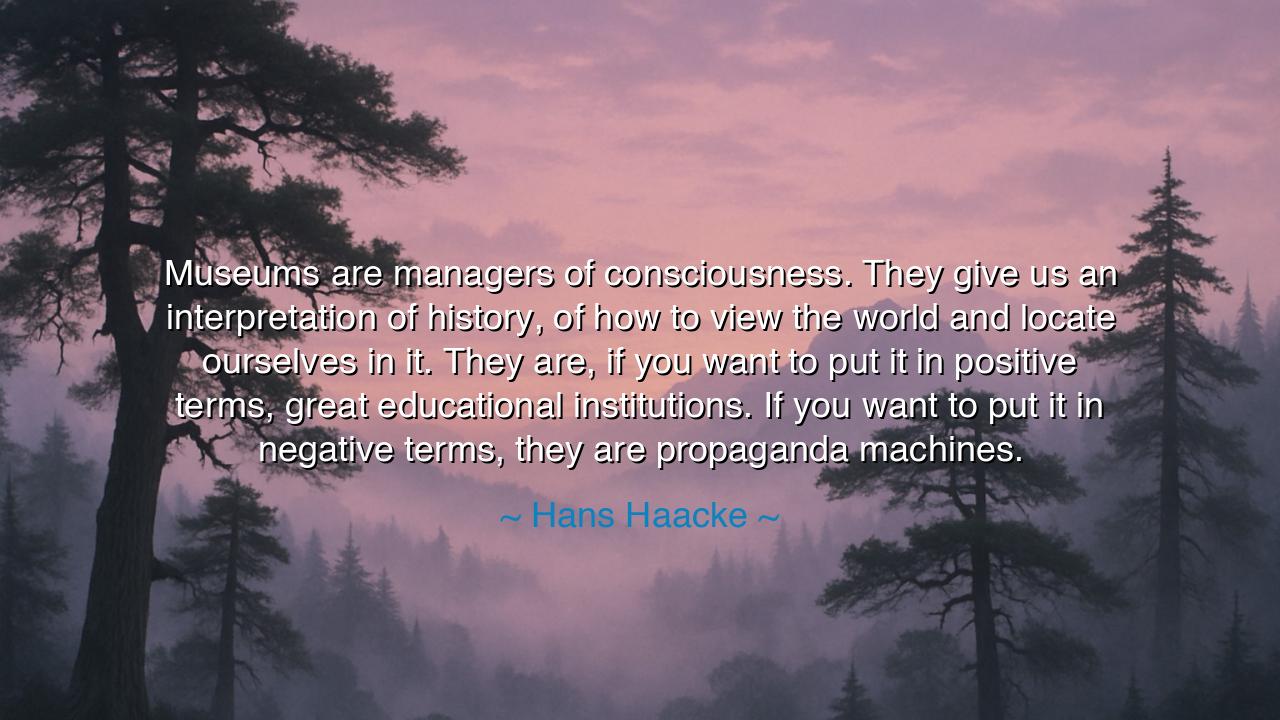
Museums are managers of consciousness. They give us an
Museums are managers of consciousness. They give us an interpretation of history, of how to view the world and locate ourselves in it. They are, if you want to put it in positive terms, great educational institutions. If you want to put it in negative terms, they are propaganda machines.






“Museums are managers of consciousness. They give us an interpretation of history, of how to view the world and locate ourselves in it. They are, if you want to put it in positive terms, great educational institutions. If you want to put it in negative terms, they are propaganda machines.” — Hans Haacke
In these profound words, the artist and philosopher Hans Haacke unveils a truth that shimmers between light and shadow: that museums, those solemn temples of art and memory, do not merely preserve the past—they shape the mind of the present. To the unthinking eye, a museum may seem a sanctuary of knowledge, where relics of time stand silent beneath glass. But Haacke warns us that they are more than that. They are “managers of consciousness”—keepers not only of objects, but of meaning itself. Through what they display, and through what they hide, they whisper to us who we are and what we are meant to remember.
In the ancient world, knowledge was power, and those who shaped the story shaped the soul of the people. The scribes of Egypt, the historians of Rome, the priests of the temples—each was a guardian not just of truth, but of narrative, which is truth’s twin and rival. The museum, in the modern age, has inherited that sacred and dangerous role. When Haacke calls them “educational institutions,” he honors their potential to illuminate the mind. But when he calls them “propaganda machines,” he exposes the peril of their power—to turn history into an instrument of control, to mold thought as surely as a sculptor molds clay.
Consider the British Museum, filled with treasures from Greece, Egypt, Mesopotamia—wonders taken from lands once ruled by empire. To the visitor, these artifacts tell a story of human achievement; yet beneath their beauty lies another story—of conquest, colonialism, and possession. Who decides which story is told? The museum, by its very silence, manages consciousness, guiding the gaze away from discomfort toward admiration. Thus, Haacke’s warning rings true: the power to curate is the power to define reality itself.
Yet let us not despair, for within this power lies possibility. If museums can be instruments of deception, they can also be instruments of awakening. When the curators of the National Museum of African American History and Culture in Washington, D.C., built their galleries, they did not hide the pain—they wove it into the light. Through song, struggle, and truth, they revealed the unbroken dignity of a people once silenced. This, too, is the management of consciousness—but in service of truth, not control. Thus, the museum becomes what Haacke called it at its best: a “great educational institution”, where humanity learns not what to think, but how to see.
The lesson is ancient and eternal: every keeper of knowledge bears moral weight. Whether a priest, a teacher, or a curator, the one who tells the story holds the power to guide the minds of generations. If that power is used with integrity, it enlightens; if corrupted, it enslaves. The wise, therefore, must enter every hall of history—every museum, every book, every broadcast—with the vigilance of a philosopher and the humility of a seeker. Ask always: Who chose these stories? What voices are missing? What truths are waiting to be unearthed?
For Haacke’s insight reaches beyond museums. We all, in our way, are managers of consciousness—in our homes, our classrooms, our communities. Every tale we tell, every belief we share, shapes another’s vision of the world. We must, therefore, speak truth with compassion, and teach history not as a weapon but as a mirror—so that all may see themselves in it.
So let this be your teaching, O listener of the future: honor the storytellers, but question the story. Walk the marble halls of the museum with open eyes and a fearless heart. Admire the beauty of the artifacts, but seek also the silence between them. For wisdom lies not only in what is displayed, but in what is withheld. And when you have learned to see both—the light and the shadow—you will no longer be managed by consciousness. You will have mastered it.
Thus, as Haacke reminds us, the true museum is not built of stone—it is built within the human mind. Guard it well. For he who controls the story controls the soul, but he who seeks truth beyond the story sets the soul free.






AAdministratorAdministrator
Welcome, honored guests. Please leave a comment, we will respond soon